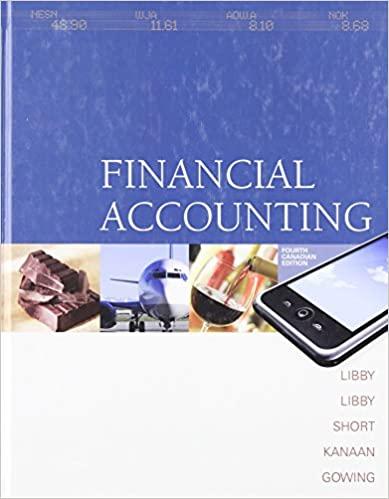Question
Camarillo Manufacturing Company was established to manufacture two types of pipe fittings, XL1 and XL2. The manufacturing process involves molding the fittings and then smoothing
Camarillo Manufacturing Company was established to manufacture two types of pipe fittings, XL1
and XL2. The manufacturing process involves molding the fittings and then smoothing them.
The firm
was initially capitalized with $500,000 as an S Corporation. The firm purchased
equipment for $450,000 with cash of $125,000 and a note payable o
f $325,000. It also acquired
furniture
for $120,000 with cash of $60,000 and a note payable of $60,000. Mana
gement is now
preparing the master budget for the first year of operations.
Sales Budget
Management expects to meet established market prices for its pipe fittings of $40 for XL1 and $32
for XL2. Sales representatives have estimated that total sales of
XL1 fittings will be 4,500 units
and sales of XL2 will be 12,000 units.
Production Budget
Management has expressed a desire to have 1,000 units of XL1 and 3,000 units of XL2 in ending
inventory.
Material Acquisition Budget
The firms industrial enginee
r has prep
ared standards that call for 0.6
pounds of material per XL1
casting and 0.4 pounds per XL2 casting.
Both products require the same material. Management
also desires to end the period with 1,000 pounds of material in raw materials inventory. Th
e
purchasing agent anticipates that the metal can be purchased at an average cost of $5 per pound.
Direct Labor Budget
The standa
rds for a unit of XL1 call for
0.5 hours of direct labor in Molding and 0.3 hours in
Smoothing. The standards for a unit of
XL2 call for 0.4 hours in
Molding
and 0.2 hours in
Smoothing. Managements anticipated average cost for labor is $16 per hour.
Factory Overhead Budget
Service Department 1 handles personnel matters. The firm anticipates having 12 factory
employees and expects the variable costs to operate the personnel department to average $1,000
per employee. The cost of this department is allocated to other departme
nts on the assumption
that there will be three employees in the maintenance department, five employees in the molding
department, and four employees in the smoothing department. The personnel departments fixed
costs are estimated to be $15,000 and will b
e allocated on a lump sum basis at $3,000 to
maintenance, $6,000 to molding and $6,000 to smoothing.
The maintenance department is budgeted to make 100
service calls during the period,
60 calls for
the molding department and 40 calls for the smoothing dep
artment.
The maintenance manager
estimates that it will cost an average of $150 in variable costs per service call. The fixed costs of
$14,000 are thought to benefit the two production departments equally.
The molding department is expected to incur $29
,000 in variable overhead and $42,000 in fixed
overhead. The smoothing department is expected to have $32,000 in variable overhead and $8,000
in fixed overhead.
Management has decided to allocated 60% of the fixed overhead cost of molding to XL1 and 40%
to XL2 and split the fixed smoothing costs evenly between the two products. Variable costs will
be allocated based on direct labor hours.
Selling and Administration Expenses Budget
Budgeted selling and ad
ministration expenses are $126,4
00. This
includes sales commissions at
10% of sales or $56,400; administration salaries of $30,000; advertising of $6,000; supplies of
$2,000 and interest of $32,000.
Budgeting
Cash Receipts and Di
sbursements
Sales are presumed to be
$100,000 in the first quarter
; $140,000 in the second quarter; $200,000
in the third quarter and $124,000 in the fourth quarter. Seventy percent of sales will be paid for in
the quarter in which they are made and thirty percent will be paid in the quarter following the sale.
Product
ion will be spread uniformly over the year. The firm will pay for materials, supplies, and
labor in the quarter the cost is incurred. Utilities will be paid one month after incurred. Half the
property tax is aid in the first and third quarters. The fir
st payment
for
a new company is not made
until the third quarter. Sales commissions are paid in the quarter a sale is made. Other selling and
administration costs are incurred and paid uniformly. Finally, the firm makes note payments of
$30,000 per quar
ter which consists of $22,000 of principal repayment and $8,000 of interest. Total
Cos
ts include depreciation of $27,000; $21,0
00 for equ
i
pment
and $6,000 for the furniture
.
Additional Information
Factory Overhead Budget
Personnel
Maintenance
Molding
Smoothing
Variable Overhead Items
Indirect Labor
$6,000
$8,000
$9,000
$18,000
Supplies
4,000
3,000
19,000
8,000
Utilities
2,000
1,000
1,000
6,000
Step by Step Solution
There are 3 Steps involved in it
Step: 1

Get Instant Access to Expert-Tailored Solutions
See step-by-step solutions with expert insights and AI powered tools for academic success
Step: 2

Step: 3

Ace Your Homework with AI
Get the answers you need in no time with our AI-driven, step-by-step assistance
Get Started


